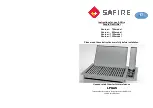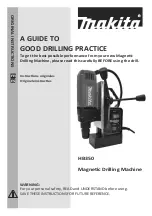
37
EnGLIsh
Performing an Application (Fig. A)
WARNING:
TO REDUCE THE RISK OF PERSONAL
INJURY, ALWAYS
ensure workpiece is anchored or
clamped firmly. If drilling thin material, use a wood
“backup” block to prevent damage to the material.
WARNING:
Always wait until the motor has come to
a complete standstill before changing the direction
of rotation.
Switching On and Off (Fig. A)
To turn the tool on, depress the trigger switch
1
.
To stop the tool, release the trigger switch.
Drilling with a Solid Bit (Fig. A)
1. Insert the appropriate drill bit.
2. Set the mode selector switch
4
to the 'rotary
hammering' position.
3. Set the electronic speed and impact control dial
10
.
4. Fit and adjust the side handle
2
.
5. Mark the spot where the hole is to be drilled.
6. Place the drill bit on the spot and switch on the tool.
7. Always switch off the tool when work is finished and
before unplugging.
Drilling with a Core Bit (Fig. A)
1. Insert the appropriate core bit.
2. Assemble the centerdrill into the core bit.
3. Set the mode selector switch
4
to the 'rotary
hammering' position.
Operation Modes (Fig. A)
WARNING:
Do not select the operating mode when the
tool is running.
CAUTION:
Never use in Rotary Drilling or Rotary
Hammering mode with a chisel bit in the bit holder.
Personal injury and damage to the the tool may result.
Your tool is equipped with a mode selector dial
4
to select the
mode appropriate to desired operation.
Proper hand position requires one hand on the main handle
5
,
with the other hand on the side handle
2
.
Proper Hand Position (Fig. A, E)
WARNING:
To reduce the risk of serious personal injury,
ALWAYS
use proper hand position as shown.
WARNING:
To reduce the risk of serious personal
injury,
ALWAYS
hold securely in anticipation of a
sudden reaction.
OPERATION
Instructions for Use
WARNING:
Always observe the safety instructions and
applicable regulations.
WARNING:
To reduce the risk of serious personal
injury, turn tool off and disconnect battery pack
before making any adjustments or removing/
installing attachments or accessories.
An accidental
start-up can cause injury.
Bit and Bit Holder
WARNING:
Burn Hazard.
ALWAYS
wear gloves when
changing bits. Accessible metal parts on the tool and bits
may get extremely hot during operation. Small bits of
broken material may damage bare hands.
The rotary hammer can be fitted with various chisel bits
depending on the desired application.
Use sharp drill
bits only.
Inserting and Removing SDS MAX® Accessories
(Fig. D)
This machine uses SDS MAX® bits and chisels (refer to the inset
in Figure D for a cross‑sectio n of an SDS MAX® bit shank).
1. Clean the bit shank.
2. Pull back the locking sleeve
7
and insert the bit shank.
3. Turn the bit slightly until the sleeve snaps into position.
4. Pull on the bit to check if it is properly locked. The
hammering function requires the bit to be able to move
axially several centimetres when locked in the tool holder.
5. To remove a bit pull back the tool holder locking sleeve/
collar
7
and pull the bit out of the tool holder
6
.
symbol
Mode
application
Rotary
hammering
Drilling into concrete
and masonry
hammering only
Light chipping
Bit adjustment
Chisel bit position adjustment
To Select an Operating Mode
• Rotate the mode selector dial so that the arrow points to the
symbol corresponding for the desired mode.
nOTE:
The arrow on the mode selector dial
4
must be pointing
at a mode symbol at all times. There are no operable positions
in between. It may be necessary to briefly run the motor after
having changed from 'hammering only' to 'rotary hammering'
modes in order to align the gears.
Indexing the Chisel Position (Fig. A)
The chisel can be indexed and locked into 18 different positions.
1. Rotate the mode selector switch
4
until it points towards
the
position.
2. Rotate the chisel in the desired position.
3. Set the mode selector switch
4
to the hammering
only position.
4. Twist the chisel until it locks in position.
















































